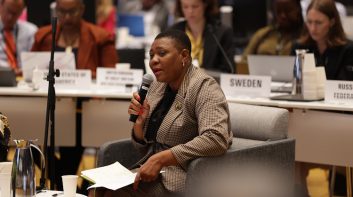
A day in the life of a quick-witted HIV peer supporter
Known for his quick wit and infectious laugh, Stephen is helping other young Zimbabweans living with HIV to lead happy, healthy, safe and fulfilled lives. This is a day in his life as a community adolescent treatment supporter (CATS) with Africaid Zvandiri.
When I wake up in the morning, I take care of my bed and start to cook and prepare my food. Then I make sure that I have my lunchbox and a bottle of water before I visit my health facility where I work. My favourite is when I have either potatoes or rice as part of my breakfast.
At the facility, I firstly report to my supervisor when I arrive to plan for the day. We have a small discussion after which I go to my “office” which is the adolescent-friendly corner to prepare the topic to discuss for that day’s participants. The adolescent corner is a place where young people interact with their peers, taking part in activities that raise awareness around their health through tools and materials that are age appropriate, and fun.
After that I monitor adherence and share information about adherence with each client. The average amount of clients I will see per day is 30, but it depends on the day. On a drug pick-up day, about 30 adolescents will come to pick up their drugs so I will do a small discussion with them.
The children come with their caregivers so I have to see the caregiver first before I see the child. With the six-year-olds, we start with playing games, talking about motivational stories, having fun and getting them comfortable.
House to house
If I am doing a home visit, I make sure that I document the child that I am going to see that day. Today I need to see Lydia and Munyaradzi. Because they live near me, this cuts the cost of the bus fares, which I will not be using today. Typically, I can see five people per day. The best thing to do is to have an updated list of young people that you want to see and prepare so that everything goes well.
Before I do the home visit I would have received support from my supervisor at the facility. As mentioned earlier through our planning meeting for the week, the supervisor will share with me the list of clients that need support, if they are new clients my supervisor notifies the client and caregiver of my upcoming visit, gives me details about the client and advises on how to conduct the home visit especially for those cases that are sensitive. When I arrive at a child’s home, I introduce myself in a good way to the caregiver. So it’s easier for me to monitor that child because the caregiver knows that I am working at the facility, where their child is getting medicines.
I explain that I want to monitor their child’s adherence, talk to them about life experience, and motivating each other, including through our monthly support group. At the end the day I document the visit in the mobile database ZVAMODA application and report back to clinic staff all my visits at the end of week.
Decompressing after work
I was someone full of anger when I was growing up and I defaulted on my medication when my mother and father passed away in 2006. In 2010, I joined the Zvandiri support group.
I then joined the CATS programme. I started to help my peers and the community. Now I’m a youth advocate for young people. I believe in myself and I love myself.
After work I go I text my girlfriend to meet her in town so that we can go for an ice cream to refresh my mind because I was busy all day. We will talk about sweet things and I like it when my girlfriend asks me, “Steve, how was your day, how was work?” I am also good at listening when my girlfriend is speaking, I love and respect her. We always make plans together, we support each other and I am happy to take care of my girlfriend.
After that I will go home and prepare my supper. I listen to R&B music until I fall asleep. During my spare time, I go to a sports club to release my stress by playing cricket. You know that when you work in the community you meet different people sharing different stories. Some are motivational, some are so touching and some are so painful.
About our programme
Stephen is a community adolescent treatment supporter with READY+ which is part of a portfolio of programmes designed to build Resilient and Empowered Adolescents and Young people (READY). The four-year programme aims to reach 30,000 adolescents and young people living with HIV in Mozambique, eSwatini, Tanzania and Zimbabwe. Its focus is on increasing access to holistic care and support: promoting not only sexual and reproductive health and rights but also mental health in order to foster resilience.
Further Reading
Tags
Adolescents and young peopleCommunity Adolescent Treatment Supporters (CATS)HIV preventionREADYZimbabwe
Will you help us end aids?
I would like to make a donation of:
Please enter the amount you would like to donate, ie: '10.00'


